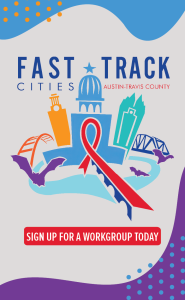People Living with HIV Stigma Index 2.0
The Austin/Travis County Fast-Track Cities initiative is excited to announce a local project aimed at better understanding how stigma, or negative feelings or treatment from others, affects people living with HIV/AIDS in our community. This project is called the People Living with HIV (PLHIV) Stigma Index. It will be carried out in the Austin Transitional Grant Area, which includes Bastrop, Caldwell, Hays, Travis and Williamson counties, between March 2025 and January 2026.
The PLHIV Stigma Index is an interview-based survey created by an international network of people living with HIV. Our team will use this survey to interview over 100 PLHIV and learn how stigma impacts our community.
Our goal is to gather a large amount of data on the stigma that Austin-area PLHIV face and how it impacts their lives. This information can be used by healthcare providers, governments and nonprofits to fine-tune services to reduce the barriers of stigma and help end HIV/AIDS in our community. By learning about stigma directly from PLHIV, we will be better equipped to work for positive changes in the Austin area.
A PLHIV-led steering committee has been formed and has monthly meetings to lead project efforts.
For questions about this project or how to get involved, please reach out to Program Coordinator Michelle Osorio (michelle.osorio@austintexas.gov).
People Living with HIV Stigma Index
About Fast-Track Cities
Fast-Track Cities is a global partnership between more than 380 cities, the International Association of Providers of AIDS Care (IAPAC), the Joint United Nations Programme on HIV/AIDS (UNAIDS), the United Nations Human Settlements Programme (UN-Habitat), and the City of Paris. The partnership’s aim is to end urban HIV epidemics by getting to zero new HIV infections, zero AIDS-related deaths, and zero HIV-related stigma. Launched on World AIDS Day 2014, the partnership also advances efforts to end tuberculosis (TB) epidemics and eliminate viral hepatitis (HBV and HCV) in urban settings by 2030. For more information about the Fast-Track Cities initiative, please visit: https://www.fast-trackcities.org (Retrieved from IAPAC Announces Fast-Track Cities Progress on World AIDS Day and Initiatives 7th Anniversary).
The international Fast-Track Cities (FTC) initiative helps local communities share ideas and practices to leverage resources to create community progress to end the HIV/AIDS epidemic.
In June 2018, the City of Austin Mayor and Travis County Judge signed the Paris Declaration committing to achieve a set of 95-95-95 (recently raised from 90-90-90) targets which contain initiatives to end the global AIDS epidemic by 2030. In February 2022, these Austin/Travis County leaders signed the updated Paris Declaration 4.0. The 95-95-95 targets to end the AIDS epidemic are a call for jurisdictions to do the following:
- Diagnose 95% of people living with HIV,
- Provide anti-retroviral treatment (ART) for 95% of those diagnosed, and
- Achieve viral suppression for 95% of those on ART
More information:


